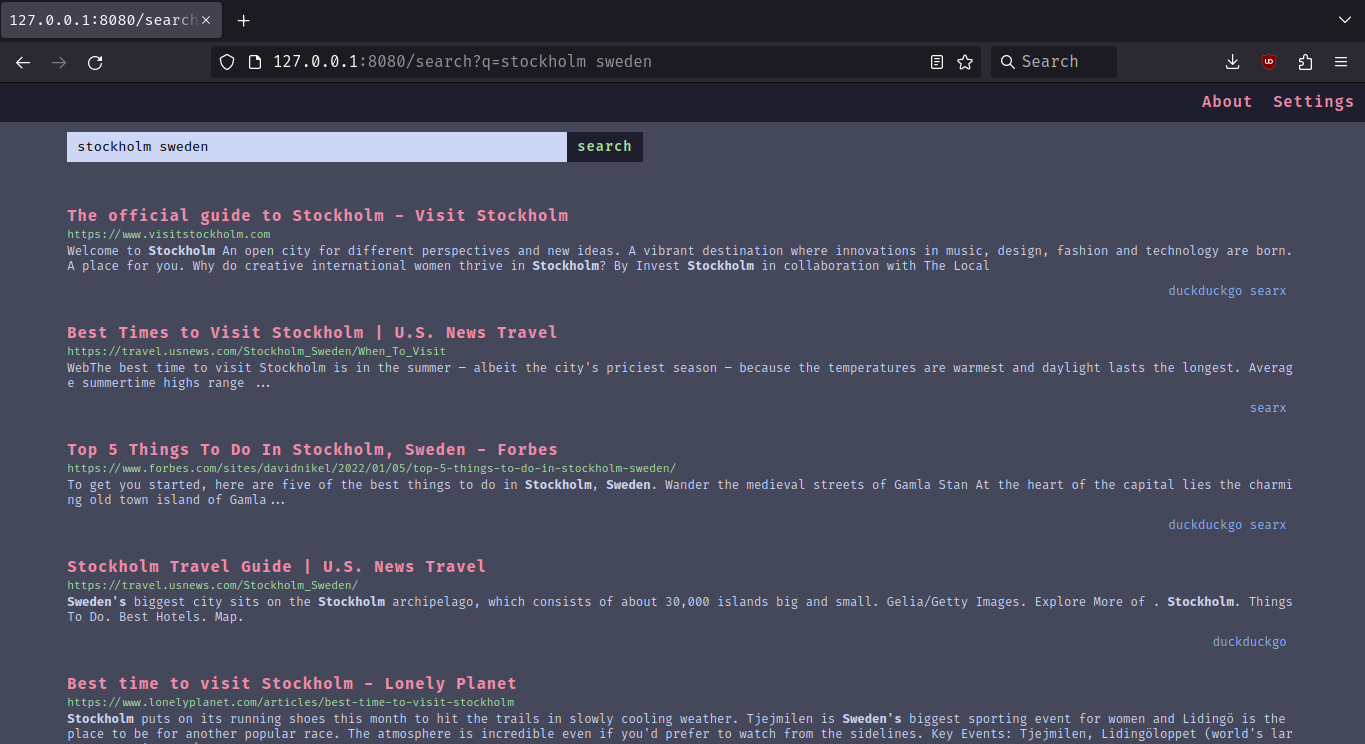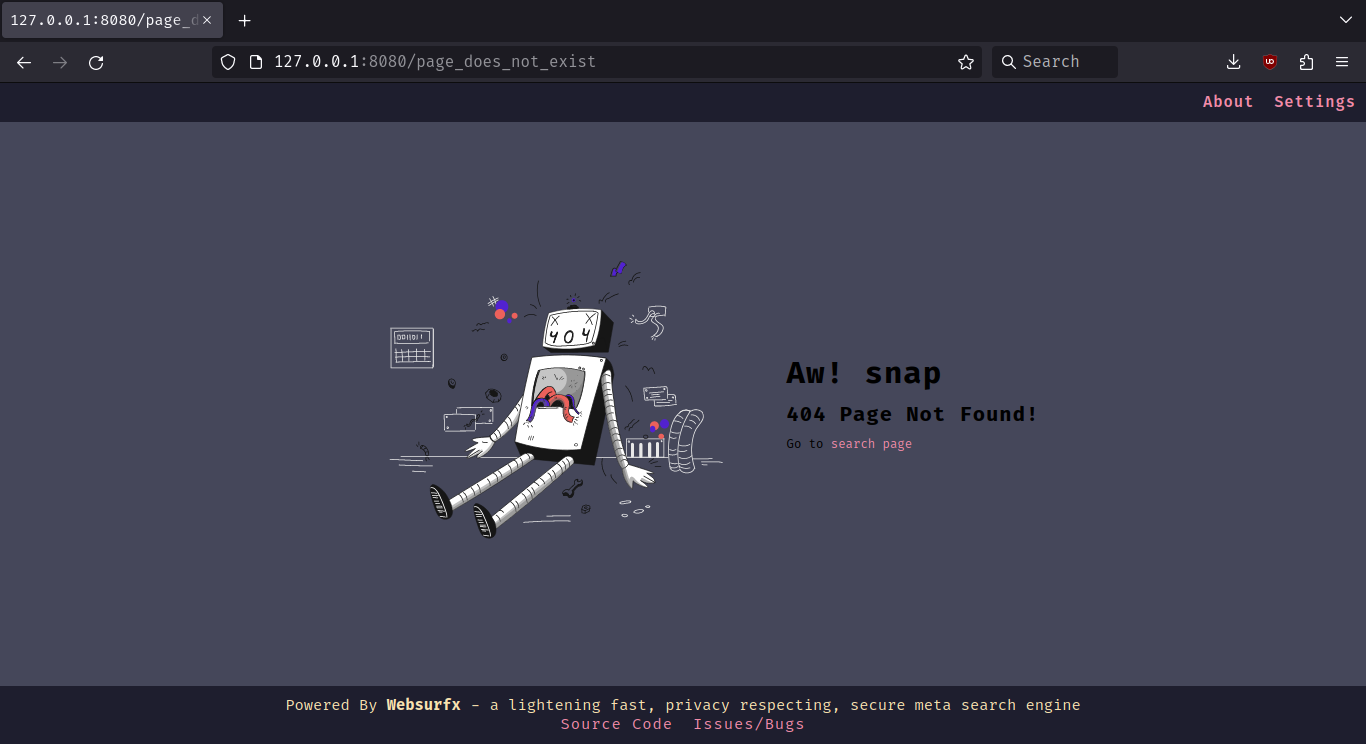- cross-posted to:
- [email protected]
- [email protected]
- [email protected]
- cross-posted to:
- [email protected]
- [email protected]
- [email protected]
cross-posted from: https://programming.dev/post/2678496
Introduction
Hello everybody, About 5 months ago I started building an alternative to the Searx metasearch engine called
Websurfxwhich brings many improvements and features which lacks in Searx like speed, security, high levels of customization and lots more. Although as of now it lacks many features which will be added soon in futures release cycles but right now we have got everything stabilized and are nearing to our first releasev1.0.0. So I would like to have some feedbacks on my project because they are really valuable part for this project.In the next part I share the reason this project exists and what we have done so far, share the goal of the project and what we are planning to do in the future.
Why does it exist?
The primary purpose of the
Websurfxproject is to create a fast, secure, and privacy-focused metasearch engine. While there are numerous metasearch engines available, not all of them guarantee the security of their search engine, which is critical for maintaining privacy. Memory flaws, for example, can expose private or sensitive information, which is never a good thing. Also, there is the added problem of Spam, ads, and unorganic results which most engines don’t have the full-proof answer to it till now. Moreover, Rust is used to write Websurfx, which ensures memory safety and removes such issues. Many metasearch engines also lack important features like advanced picture search, which is required by many graphic designers, content providers, and others. Websurfx attempts to improve the user experience by providing these and other features, such as providing custom filtering ability and Micro-apps or Quick results (like providing a calculator, currency exchanges, etc. in the search results).Preview
Home Page
Search Page
404 Page
What Do We Provide Right Now?
- Ad-Free Results.
- 12 colorschemes and a
simpletheme by default.- Ability to filter content using filter lists (coming soon).
- Speed, Privacy, and Security.
In Future Releases
We are planning to move to
leptosframework, which will help us provide more privacy by providing feature based compilation which allows the user to choose between different privacy levels. Which will look something like this:
Default:It will usewasmandjswithcsrandssr.Harderned:It will usessronly with somejsHarderned-with-no-scripts:It will usessronly with nojsat all.Goals
- Organic and Relevant Results
- Ad-Free and Spam-Free Results
- Advanced Image Search (providing searches based on color, size, etc.)
- Dorking Support (in other words advanced search query syntax like using And, not and or in search queries)
- Privacy, Security, and Speed.
- Support for low memory devices (like you will be able to host websurfx on low memory devices like phones, tablets, etc.).
- Quick Results and Micro-Apps (providing quick apps like calculator, and exchange in the search results).
- AI Integration for Answering Search Queries.
- High Level of Customizability (providing more colorschemes and themes).
Benchmarks
Well, I will not compare my benchmark to other metasearch engines and Searx, but here is the benchmark for speed.
Number of workers/users: 16 Number of searches per worker/user: 1 Total time: 75.37s Average time per search: 4.71s Minimum time: 2.95s Maximum time: 9.28sNote: This benchmark was performed on a 1 Mbps internet connection speed.
Installation
To get started, clone the repository, edit the config file, which is located in the
websurfxdirectory, and install the Redis server by following the instructions located here. Then run thewebsurfxserver and Redis server using the following commands.git clone https://github.com/neon-mmd/websurfx.git cd websurfx cargo build -r redis-server --port 8082 & ./target/debug/websurfxOnce you have started the server, open your preferred web browser and navigate to
http://127.0.0.1:8080to start using Websurfx.Check out the docs for docker deployment and more installation instructions.
Call to Action: If you like the project then I would suggest leaving a star on the project as this helps us reach more people in the process.
“Show your love by starring the project”
Project Link:
Very cool. How does the compare to the SearXNG fork of Searx?
Wondering the same here.
Hello again :)
I am sorry for being late to reply, I think I would suggest opening an issue on this topic here:
https://github.com/neon-mmd/websurfx/issues
Because I feel it would be better to have a discussion there. Also, I will be able to explain in more depth.
(full disclosure: I am the owner of the project)
This seems super promising! Definitely gonna keep an eye on this until I can easily deploy it in Docker on my Pi.
Oooh, I’ve never even heard of searx or anything like this, sounds right up my alley though!! :-D Thank you
Note: the benchmark was performed on a 1Mbps connection speed.
That seems… questionably useful as an overall performance indicator. I feel like you should test with a handful more bandwidths in there, up to at least a gigabit connection.
Why would we need an alternative to SearX?
Like other than the reasons listed in the post?
There’s nothing in the post that directly compares Websurfx to SearX, it’s a valid question. "Security, speed, high levels of customization’ aren’t really a comparison without specifics
I mean like that’s getting pretty nitpicky if you need them to hand list it.
Especially speed like you want the functions they optimized?
Not at all nitpicky. "it’s faster and more secure’. Well, how? There’s no details provided to support the claims. My banana is both more secure, faster and juicier than yours. Don’t I need evidence to support that statement? Or is that enough for you to accept it?
SearX is not maintained, it’s either SearXNG, this, or PreSearch
Hello again :)
I am sorry for being late to reply, I think I would suggest opening an issue on this topic here:
https://github.com/neon-mmd/websurfx/issues
Because I feel it would be better to have a discussion there. Also, I will be able to explain in more depth.
(full disclosure: I am the owner of the project)
I see a docker compose but don’t know what this line means :
build: .I am not very educated in this regard.
Does that mean I have to dl the repo, run docker-compose up and it will build the image ?
I want to say yes, which line are u speaking of ?
From doc for deployment with docker
After this run the following command to deploy the app:
docker compose up -d --build
I’m talking about the line I quoted earlier: “build: .”
I’ll try later
As a non developer - why does this require some sort of installation? The general idea of a search engine is “go to a website and it helps you search for websites”.
This is a “self hosted” community.
That require an installation if you want self hosted ur proper search engine, without depending someone.
Other else, you can wait, that someone will do the job ans put it on the web avalaible for all,If someone take an vps, and mount it on it, the address will be “vps.adress” instead of localhost,
You can install it on an rbpi at your home an make it avalaible for it too, for the resident.
I don’t know if you understand now, I hope.
Sorry my English.
Is there publically accessible version by the developers?
the project link dude, its on github with an AGPL’s Licence
I’m asking if there is an instance ran by the developers so we can try it before self hosting
XD sorry, obviously I didn’t get it.
I guess no,
deleted by creator
Yes, I totally agree with you
Websurfxis a self-hosted metasearch engine, so you can host it on your local machine or a web server, and you can use it on a daily basis :).(full disclosure: I am the owner of the project)
This is software that aggregates results from other software engines whilst trying to keep you anonymous (if you have noticed, you are definitely not anonymous if you search using Google) and prevent fingerprinting. You need to be the one to run this software though. Search “client-server model”, and then imagine running both the server and the client at home













